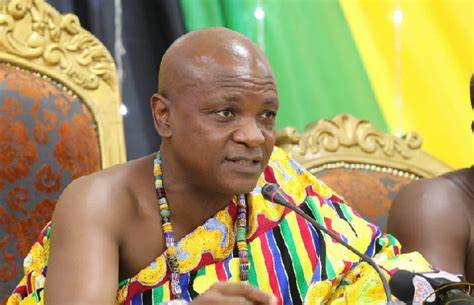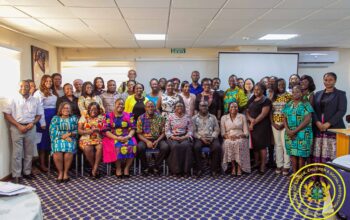Togbe Afede XIV, the Agbogbomefia (King) of the Asogli State, has often spoken out about the state of Ghana’s economy and the governance issues plaguing the country. He has been a vocal critic of the government on various occasions, particularly on issues related to corruption, mismanagement, and the economic challenges faced by the country.
His criticism of the government comes from a deep concern for the well-being of the people, especially the marginalized and vulnerable communities. In recent years, he has expressed frustration over the country’s worsening economic situation, which has been exacerbated by inflation, debt, and a growing cost of living.
His public statements have also pointed out the disconnect between the leadership’s actions and the aspirations of the people, particularly in the wake of corruption scandals and mismanagement in various sectors of government. Togbe Afede XIV has been outspoken in calling for greater accountability and better governance, urging both the government and the citizens to take collective responsibility for the nation’s progress.
His influence, both as a traditional ruler and a prominent figure in the business community, gives his words significant weight. He has strongly advocated for policy reforms, national unity, and promoting values like honesty, transparency, and hard work.
Togbe Afede XIV, the Agbogbomefia of the Asogli State, has indeed expressed strong discontent about Ghana’s economic situation, especially the escalating cost of living and the country’s growing debt burden. His criticism comes at a time when Ghana’s economic indicators, such as inflation, rising public debt, and the devaluation of the cedi, have become major concerns for both ordinary citizens and business leaders.
Togbe Afede has pointed to reckless borrowing by the government as a key factor contributing to the current economic challenges. Ghana’s external debt has increased significantly in recent years, with government borrowing seen as unsustainable by many analysts. Despite this, the country’s ability to service its debt has been under increasing pressure due to declining revenues, which has resulted in Ghana seeking an International Monetary Fund (IMF) bailout and implementing austerity measures.
Togbe Afede’s frustration stems from the fact that the government’s borrowing strategy has not been accompanied by significant infrastructure development or investments that would benefit the public. Instead, many of these loans have been used to finance budget shortfalls and consumption, rather than long-term growth.
The cost of living in Ghana has been skyrocketing, driven by high inflation, especially in food prices, fuel, and transportation. Ordinary citizens, including traders, workers, and students, are finding it increasingly difficult to meet their basic needs. The government’s inability to effectively address the cost-of-living crisis has added to the sense of economic hardship, leading many Ghanaians to question the leadership’s priorities and decision-making.
Togbe Afede has been particularly vocal in expressing his anger over the way government policies and actions have not been responsive to the struggles of the average Ghanaian. He has criticized the leadership for failing to safeguard the welfare of the people while indulging in reckless financial decisions, which have exacerbated the suffering of the population.
Togbe Afede’s public statements often call for accountability in government and a return to prudent fiscal management. He has urged the government to prioritize transparency, reduce wasteful expenditure, and engage in responsible borrowing to avoid burdening future generations with an unsustainable debt load.
Togbe Afede has warned that the excessive reliance on borrowing to finance the country’s budget could have disastrous long-term consequences if not carefully managed. He has advocated for a focus on restructuring the economy, improving domestic production, and investing in sectors that will generate wealth for Ghanaians rather than sinking the country deeper into debt.
As a traditional leader, Togbe Afede’s criticism carries weight. He has long been seen as a champion of social justice and national development. His role as Agbogbomefia of Asogli State places him in a unique position to influence both political and public discourse, particularly among the Volta Region and beyond. His leadership, combined with his track record as a businessman, gives him credibility when speaking about Ghana’s economic and governance issues.
Togbe Afede’s concerns are not only about the present but also about Ghana’s future. His advocacy calls for a shift in mindset towards responsible economic management, where the welfare of the people comes first, and government actions are transparent, equitable, and sustainable.
In summary, Togbe Afede XIV’s anger at the state of the economy, particularly in regard to rising living costs and reckless borrowing, highlights a broader national conversation on Ghana’s economic policies. His critique serves as a call to action for both the government and the citizens to reassess the current trajectory and ensure that the country’s resources are used wisely and for the benefit of all.
Togbe Afede XIV’s remarks at the 2024 Asogli Te Za Grand Durbar in Ho were a powerful reflection of his growing frustration with the state of Ghana’s economy. His speech highlighted the severe economic challenges facing the country, including Ghana’s high levels of indebtedness, the soaring cost of living, and the depreciating cedi. Here are some key points from his speech and the broader concerns he expressed.
Togbe Afede’s comment on Ghana’s massive debt burden underscores a key concern: while the country has borrowed extensively, there is little to show for it in terms of tangible development. Despite borrowing large sums of money, Ghana continues to suffer from critical shortages in infrastructure, services, and economic growth. This discrepancy raises questions about how these borrowed funds have been utilized and whether the loans have been channeled into productive projects or mismanaged.
The lack of visible development and the continued debt accumulation without clear benefits for the populace have left many Ghanaians wondering if they are paying the price for poor fiscal management and corruption. The country’s debt-to-GDP ratio has been consistently high in recent years, which has led to growing concerns about Ghana’s ability to service its debt and the long-term impact on the economy.
Togbe Afede’s remarks on the high rate of inflation capture the daily struggles of Ghanaians. Inflation, especially in the areas of food prices and fuel, has made life increasingly difficult for ordinary citizens. In his speech, Togbe noted that while inflation might seem to have “softened” recently, it is merely due to the base effect—a result of prior massive price increases that make current inflation rates appear more moderate in comparison.
Despite the apparent “softening” of inflation, prices remain high, and many people continue to feel the bite of increasing costs. This relentless rise in prices has eroded the purchasing power of many Ghanaians, pushing the most vulnerable further into poverty. Togbe’s comment reflects the widespread perception that inflation is not just a temporary issue, but a structural problem that is deeply embedded in the economy.
One of the most striking aspects of Togbe Afede’s speech was his comment on the depreciation of the cedi. The cedi’s constant devaluation against major currencies, particularly the US dollar, has been a major point of frustration for many Ghanaians. As Togbe noted, the cedi “knows only one direction”—downward. The depreciation of the currency has driven up the cost of imports, including food, medicine, fuel, and other essential goods, exacerbating the already high inflation and making it harder for businesses and individuals to cope.
The depreciation of the cedi also reflects the fragility of the economy, which is vulnerable to external economic shocks, such as changes in global commodity prices, foreign exchange fluctuations, or changes in the international financial system. Despite being a resource-rich country, Ghana has struggled to stabilize its currency, which has undermined investor confidence and made it harder for citizens to preserve their savings or make long-term financial plans.
Togbe Afede also pointed out that while Ghana is blessed with natural resources, the country remains highly vulnerable to external economic variables. These include factors like global commodity prices, changes in the prices of oil, and global inflationary pressures. Ghana’s reliance on imports for many goods—combined with the impact of external shocks such as changes in the price of crude oil or fertilizer—has made the country’s economy less resilient.
This vulnerability is compounded by the fact that many African economies, including Ghana’s, have been exposed to global supply chain disruptions and increased debt burdens. As a result, the country’s fiscal and monetary policies often seem out of sync with the realities on the ground.
Through his remarks, Togbe Afede XIV emphasized the need for responsible economic management. His frustration with the government’s handling of the economy suggests a desire for better planning, strategic investments, and more transparency in how the nation’s resources are used. Traditional leaders like Togbe Afede play a vital role in advocating for the people, and his speech calls for action from both the government and the citizenry to address the country’s economic malaise.
Togbe Afede’s speech at the Asogli Te Za Grand Durbar served as a scathing critique of Ghana’s current economic policies. His concern over the massive debt, high inflation, and depreciating cedi reflects the widespread anxiety among Ghanaians about their future. While the country remains resource-rich, its economic vulnerability to both domestic mismanagement and external shocks continues to put the livelihoods of ordinary people at risk.
Togbe Afede’s call for a more responsible and transparent approach to governance, as well as for greater accountability, reflects a desire to redirect the nation’s resources in a way that prioritizes the wellbeing of its citizens over short-term political gains. Whether the government will heed these calls for reform remains to be seen, but Togbe Afede’s words underscore the urgency of addressing Ghana’s economic challenges before they become even more entrenched.









